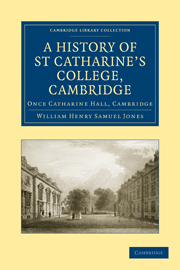Chapter II - Domestic History
Published online by Cambridge University Press: 05 June 2011
Summary
On 15 February 1858 a paper was read before the Cambridge Antiquarian Society by Charles Hardwick, in which is collected all that is known of “Robert Woodlark, Founder and first Master of St. Catharine's Hall”. Woodlark was born in the village of Wakerley, near Stamford in Northamptonshire, but nothing is known of his education before he entered on his academical career at Cambridge. There he was one of the first “Scholars” or “Fellows” of the College founded by King Henry VI in honour of St Nicholas. Two years later, in a charter issued 10 July 1443, the King modified his original plan, and authorised the erection of a new foundation, to be called the King's College of St Mary and St Nicholas, the head of which was to be styled Provost instead of Rector. The members of the first foundation were also to be members of the second, and so Woodlark became a Fellow, and then Provost, of King's, his appointment to the latter office dating from 17 May 1452. As a University officer Woodlark was a success, being chosen Chancellor in 1459 and 1462.
In 1452 Woodlark was appointed by the King's letters patent Master of the Works at King's College. His sister Isabella married as her second husband John Caunterbury, who was Clerk of the Works at the same College. His interests therefore might well have centred round the great foundation over which he presided until October 1479. A man in the position of Woodlark was unlikely, one would think, to divert even a part of his energy to founding a new collegiate body.
- Type
- Chapter
- Information
- A History of St Catharine’s College, CambridgeOnce Catharine Hall, Cambridge, pp. 44 - 173Publisher: Cambridge University PressPrint publication year: 2010First published in: 1936



